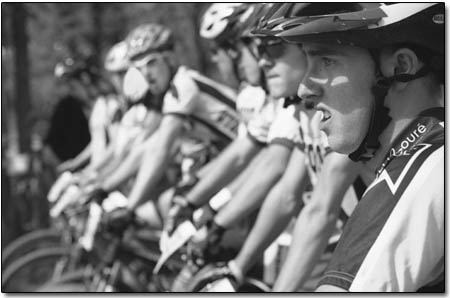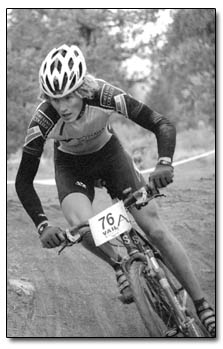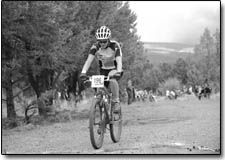|
Fort Lewis takes its cycling
club to new heights
by Amy Maestas
Sidebar: Taking the next
step: Local mountain biking team scores
 |
| FLC racer and men’s
conference champion, Jeremy Howard, eyes the track
ahead just prior to the start of the short track race
at last weekend’s conference finals at Fort
Lewis College./Photo by Ole Bye |
Durango has long been known as “God’s
velodrome.” The topography, of course, is largely
responsible. Turn in any direction and there are flats,
hills or mountains to pedal either skinny or fat tires
up or down. To boot, this town is home or training grounds
for several worldclass cyclists. This combination has
kept Durango on the country’s cycling map for well
over a decade.
But now, Durango gets its glory from several dozen up-and-coming
cyclists on the Fort Lewis Cycling club. A mere 10 years
ago, Fort Lewis didn’t even have a cycling club.
To many, that seemed a travesty in a town with so much
bicycling heritage. Then, in 1993, 12 students created
a loosely formed FLC cycling team, hoping to cash in on
the town’s backdrop and community interest. At the
time, the fledgling club had little funding and hardly
any recognition among other college teams.
Just to support the team financially, members had to
take a referendum to the FLC student body, asking it to
allow $3 of activity fees to be diverted to the cycling
club. When that passed, members felt it was the first
step on a long road toward national recognition. Most
expected it would take a few years until FLC was a major
competitor in the college circuit. After all, they were
new to the college scene. They were dead wrong.
A year later, the FLC club was crowned the National Collegiate
Cycling Association mountain bike champions.
 |
| Alex Hagnan leans into a turn on
the short track race Saturday at Fort Lewis College/Phot
by Ole Bye. |
Racing with the big dogs
“At the time, no one knew who we were,” says
Coach Rick Crawford. “People thought it was awfully
unusual for such a small school. But it started something
big at FLC.”
Indeed, in its 10-year history, FLC has won mountain
biking championships four times – 1994, 1995, 1996
and 2001. It placed second in the nation five times from
1997-2000 and again in 2002. In road racing, team members
were crowned Division II road biking champions in 2000
and 2001 and placed second in 2002 in Division I road
nationals. The team has consistently overwhelmed its competition,
often competing as a Division II school in the Division
I category with larger schools.
Last year when FLC showed up at the road national championships
in Berkeley, Calif., race organizers tried to discourage
Crawford from entering his Division II team in the Division
I category.
“We chose to race Division I because it’s
not fair to race in Division II since we are so strong,”
Crawford explains. “People call us sandbaggers because
of it, but we can hold our own there. It’s where
we belong – competitively.”
Finding freaks
Crawford is completing his third season as FLC’s
cycling coach. The club continues to grow; it has about
75 members, with at least 50 of them participating in
races each year (it’s a club sport, so everyone
is invited). The club’s annual budget is about $40,000,
according to Crawford, with half coming from the school
and half being raised by club members.
A former professional triathlete and cyclist, Crawford
has brought matchless assets to the FLC club because of
his athletic history. Besides competing internationally,
Crawford is credited with introducing five-time Tour de
France winner Lance Armstrong to professional road cycling.
After discovering the “freakish talent” of
a “wild-eyed and ignorant” Armstrong, Crawford
coached the elite cyclist for two years, setting him on
the path to become one of the world’s fiercest contenders.
Though at the time Crawford was only 28 years old, and
Armstrong only 14, the younger athlete touched a nerve
in the more experienced Crawford and unearthed a yearning
to coach.
“I was still young at the time I met Lance, who
was just a rip cord of muscle,” says Crawford, “but
I like to think I gave him the benefit of my experience.
He made me want to coach.”
Since then, Crawford has coached other nationally ranked
cyclists. He’s in his sixth season of coaching Levi
Leipheimer, the American cyclist and Tour de France racer
who rides for Team Rabobank. He also is universally recognized
as the man who turned former Fort Lewis College racer
Tom Danielson into a powerhouse cyclist, poised to match
Armstrong’s caliber and one who has his sights set
on competing in the Tour de France.
Earlier this year, Danielson claimed the new record for
the Iron Horse Bicycle Classic, shattering Jonathan Vaughter’s
1996 record by three minutes. As homage to Crawford and
the burgeoning FLC biking scene, to which he attributed
his success, Danielson donated his race winnings to his
alma mater’s club. It will be used to create the
first scholarship program.
“There’s no doubt Danielson will win the
Tour some day,” Crawford says.
Danielson’s former teammates agree. They also believe
that the buzz surrounding Danielson is a boon to the cycling
club’s future.
“It has all been a big boost of confidence to watch
Tom do his thing,” says Cody Peterson, club president.
“It let us know that (becoming professionals beyond
college) can be done.”
Like at least half of his co-riders, Peterson, a member
since 1999, chose to attend Fort Lewis College because
of the club. Raised in Ketchum, Idaho, where there is
 |
| FLC Women’s racer
Brittny Squires crosses the finish line to win a women’s
short track race last weekend at FLC./Photo by Ole
Bye. |
an abundance of mountain bike trails and challenges,
Peterson wanted to go to school where he could develop
the cross-country mountain biking career he started at
age 14. After seeing three successive years of FLC champions,
Peterson believed he would excel at a school where the
administration and community wholeheartedly supported
the rising sport.
“Part of our success is that the team has matured
a lot,” he says. “It was just once a party
school interested in being loud. The people who gave the
team its reputation are gone now, but we have so many
pro cyclists on the team, we have become a spot where
all the fast people go to win instead of party.”
As club president, Peterson says he answers about five
to six e-mails each week from prospective college students
who want to attend Fort Lewis specifically to be on the
team.
“We are big talk,” he exclaims. “Everyone
at the school is interested in us. They like to see their
team win. And since second place overall is the worse
we’ve ever done, we do well.”
The untouchables
Mike Wilk, former team president who graduated in December,
also attended Fort Lewis just for the biking experience.
Coming from New Hampshire in 1998, where he raced from
the age of 12, he joined the club.
“I wouldn’t be a professional if it weren’t
for FLC,” Wilk says. “It was the best experience
of my collegiate years.”
Now, he says, not only do students attend Fort Lewis
because of the nationally ranked club but also because
of Crawford’s coaching.
“Rick came when we were probably the lowest of
the low and now we are the highest of the high,”
he says. “Trying to motivate a college cycling team
is like trying to herd cattle. It’s a lot work,
but Rick’s done it.”
Crawford says the college years are the grassroots of
cycling in the United States. High schools across the
country don’t have organized teams or clubs, leaving
colleges to encourage and educate wanna-be cyclists.
“A lot of endurance athletes get their big start
in college. And since cycling is such a hard discipline,
most of those athletes are older when they start peaking,”
he adds.
Now that many of the club members are older, Crawford
says FLC has developed an “untouchable” group
of cross-country racers. He says racers also are improving
in the downhill discipline, as well as in road racing.
Once the club is universally strong in all disciplines,
Crawford will have reached part of his goal.
“I want to create a pretty balanced cycling community,”
he says. “I want to make FLC the premiere development
tool for young cyclists in this country. What’s
great is that this program is almost there.”
Last weekend, Fort Lewis hosted the Rocky Mountain Collegiate
Cycling Conference finals. The club won the conference
overall, with various individual racers winning every
class. The team will return to the national championships
this weekend in Angel Fire, N.M., where they hope to dominate
the field and capture a fifth title.
Meanwhile, Crawford has his eye on the various talents
of his club members. Using his experience as a gauge of
what’s to come from the Fort Lewis cyclists, there
may well be more Armstrongs and Danielsons from this corner
of the country. After all, Crawford believes it exists
here.
“This team is a putting a hickey on the giant schools.”
|

